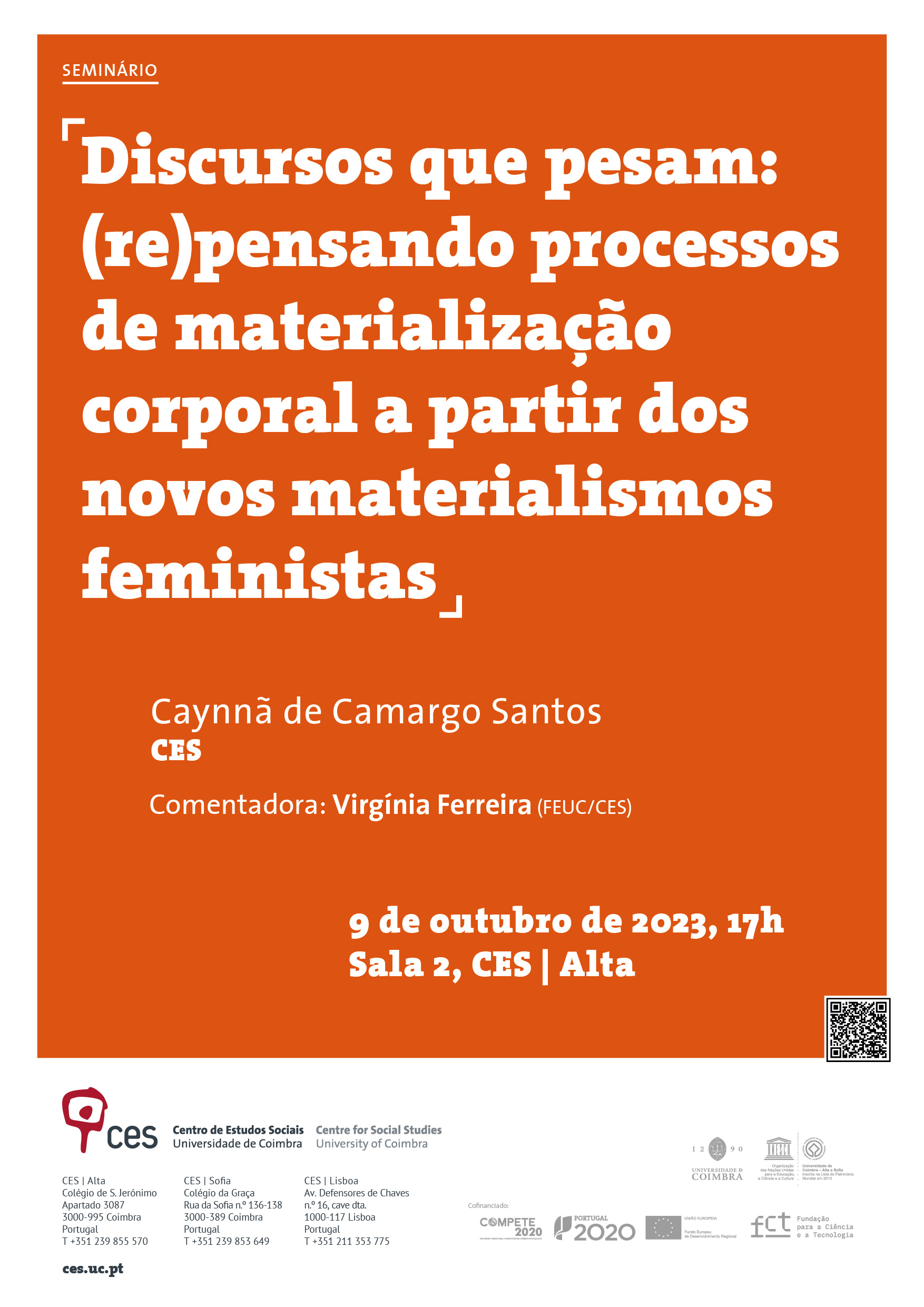Seminar
Discourses that weigh: (re)thinking processes of bodily materialisation based on new feminist materialisms
Caynnã de Camargo Santos (CES)
October 9, 2023, 17h00
Room 2, CES | Alta
Comments: Virgínia Ferreira (FEUC/CES)
Overview
In her seminal Bodies that Matter, Judith Butler (1993) argues that regulatory norms and discursive practices are associated not only with processes of subjectification - which she previously addressed in Gender Trouble from her theory of gender performativity - but also with the production of the very materiality of bodies. Based on the Foucauldian emphasis on the productive facet of the power-knowledge dynamics that take part in Western modernity, Butler (1993) states that the body and sexual differences must be understood as the result of historically contingent processes and ideologically invested with materialisation, to the detriment of the usual naturalistic understandings that identify them as given and pre-discursive biological facticities.
However, in the course of her argument, we observe that the notion of “materialisation” proposed by the author and the constitutive potentials she attributes to discursive practices are mostly confined to the realms of language, meanings and structures of intelligibility, an emphasis that leads to an under-theorisation of the physical body and the material dimensions of the regulatory practices through which bodies are performed.
Nevertheless, is there any way to literalise the post-structuralist claims that bodies are produced discursively? Is it really possible that power and regulatory norms construct bodies beyond the conceptual level? If so, how would this happen? Furthermore, what changes need to be made to our usual understandings of the nature of “discursive practices” to enable us to overcome the linguistic and epistemic limits that usually mark constructivist positions on bodies?
In this seminar, we aim to demonstrate that the recent contributions of the so-called new feminist materialisms - and especially the type of new materialism proposed by American physicist and feminist Karen Barad, called agential realism (Barad, 2007) - can illuminate our understanding of the relationships established between discursive practices and the materiality of bodies, in the sense of tensing, to the point of literalising, the post-structuralist maxim that discourses “systematically form the objects they speak of” (Foucault, 2008, p. 55).
The empirical material that will animate our discussions was produced as part of a doctoral research project whose main objective was to question, from a sociological perspective informed by the new feminist materialisms, the complex material-discursive interweavings inherent in the experiences of women with Mayer-Rokitansky-Küster-Hauser Syndrome (MRKH) in their interactions with biomedical knowledge and practice.
Bio notes
Caynnã de Camargo Santos holds a Ph.D. in Sociology from the University of Coimbra, a Master’s in Philosophy from the University of São Paulo, in the Cultural Studies Programme, and a degree from the University of São Paulo. He is currently a post-doctoral researcher at the Centre for Social Studies, as part of the project “ENGENDER: I Gender mainstreaming in curricula and pedagogical practices in Portuguese Public Universities”. He has developed his research and published in the areas of Women’s, Gender and Feminist Studies, working mainly on the following topics: sociology of gender relations, post-structuralist feminist theories, the body, new feminist materialisms and agential realism.
Virgínia Ferreira is Associate Professor of the Faculty of Economics of the University of Coimbra, Portugal, and researcher at the Center for Social Sciences. The common theme in her body of work is the analysis of how the social relationships between men and women in a society are shaped and re-shaped by various social processes and structures, namely: shifting economic and political conditions; technological revolution; labour market regulations, welfare state regimes and other societal institutions; and the attitudes, plans and behaviour of women and men in the domestic sphere. Using both qualitative and quantitative methods, her research has focused on the feminization of occupations, the changing patterns of sexual segregation of overall labour market and employment, and to the evolution of public and European equality policies. Member of the editorial board of national and international journals of social sciences and women's studies. Founding member of the Portuguese Association of Women's Studies. Since 2004, is a member of the European Commission Expert Group on Gender and Employment. Published work includes articles and essays in national and international periodicals and collective books.


